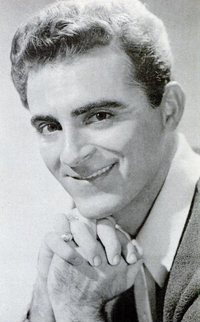
Donald Eugene Gibson was an American songwriter and country musician. A Country Music Hall of Fame inductee, Gibson wrote such country standards as "Sweet Dreams" and "I Can't Stop Loving You", and enjoyed a string of country hits from 1957 into the mid-1970s.

Arthur Alexander was an American country-soul songwriter and singer. Jason Ankeny, music critic for AllMusic, said Alexander was a "country-soul pioneer" and that, though largely unknown, "his music is the stuff of genius, a poignant and deeply intimate body of work on par with the best of his contemporaries." Alexander's songs were covered by such stars as the Beatles, the Rolling Stones, Bob Dylan, Gerry and the Pacemakers, Otis Redding, Tina Turner, Pearl Jam, and Jerry Lee Lewis.

Andrew Tyler Griggs is an American country music artist. He has released three albums for RCA Records Nashville and a fourth for Montage Music Group. These four albums have accounted for 13 singles and 6 Top Tens on the Billboard country chart, the highest being "You Won't Ever Be Lonely" and "She's More", both of which peaked at #2. He also charted "Grow Young With You", a cut from the soundtrack to the film Where the Heart Is.

Lawrence Eugene Williams was an American rhythm and blues and rock and roll singer, songwriter, and pianist from New Orleans. He is best known for writing and recording some rock and roll classics from 1957 to 1959 for Specialty Records, including "Bony Moronie", "Short Fat Fannie", "Slow Down", "Dizzy, Miss Lizzy" (1958), "Bad Boy" and "She Said Yeah" (1959). John Lennon was a fan, and the Beatles and several other British Invasion groups recorded several of his songs.

Frankie Laine was an American singer and songwriter whose career spanned nearly 75 years, from his first concerts in 1930 with a marathon dance company to his final performance of "That's My Desire" in 2005. Often billed as "America's Number One Song Stylist", his other nicknames include "Mr. Rhythm", "Old Leather Lungs", and "Mr. Steel Tonsils". His hits included "That's My Desire", "That Lucky Old Sun", "Mule Train", "Jezebel", "High Noon", "I Believe", "Hey Joe!", "The Kid's Last Fight", "Cool Water", "Rawhide", and "You Gave Me a Mountain".

Percy Tyrone Sledge was an American R&B, soul and gospel singer. He is best known for the song "When a Man Loves a Woman", a No. 1 hit on both the Billboard Hot 100 and R&B singles charts in 1966. It was awarded a million-selling, Gold-certified disc from the RIAA.
Swamp pop is a music genre indigenous to the Acadiana region of south Louisiana and an adjoining section of southeast Texas. Created in the 1950s by young Cajuns and Creoles, it combines New Orleans–style rhythm and blues, country and western, and traditional French Louisiana musical influences. Although a fairly obscure genre, swamp pop maintains a large audience in its south Louisiana and southeast Texas homeland, and it has acquired a small but passionate cult following in the United Kingdom, and Northern Europe
Bruce Channel is an American singer-songwriter best known for his 1962 number-one hit record "Hey! Baby".
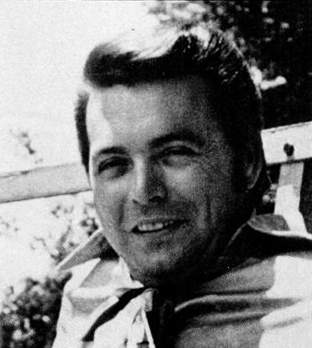
Mickey Leroy Gilley was an American country music singer and musician. Although he started out singing straight-up country and western material in the 1970s, Gilley moved towards a more pop-friendly sound in the 1980s, bringing him further success on not just the country charts, but the pop charts as well.

Thomas Adrian Sands is an American pop music singer and actor. Working in show business as a child, Sands became an overnight sensation and instant teen idol when he appeared on Kraft Television Theater in January 1957 as "The Singin' Idol". The song from the show, "Teen-Age Crush", reached No. 2 on the Billboard Hot 100 and No. 1 on Cashbox.
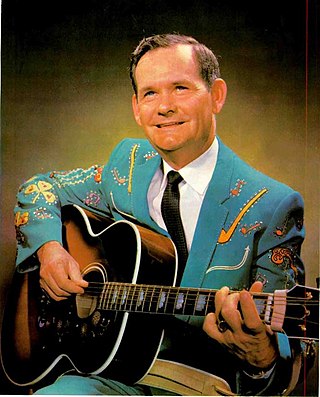
Lawrence Hankins Locklin was an American country music singer-songwriter. He had 70 chart singles, including two number one hits on Billboard's country chart. His biggest hits included "Send Me the Pillow You Dream On" and his signature "Please Help Me, I'm Falling". The latter also went to number eight on the Billboard Hot 100 pop music chart. Billboard's 100th anniversary issue listed it as the second most successful country single of the rock and roll era. It sold over one million copies, and was awarded a gold disc by the RIAA.
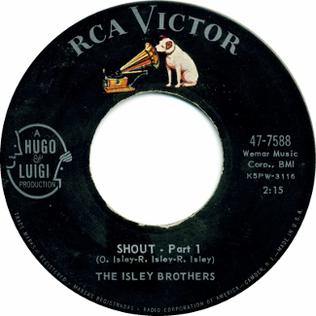
"Shout" is a popular song, written and originally recorded by American vocal group the Isley Brothers in 1959. Later versions include a UK Top 10 hit in 1964 by Scottish singer Lulu.
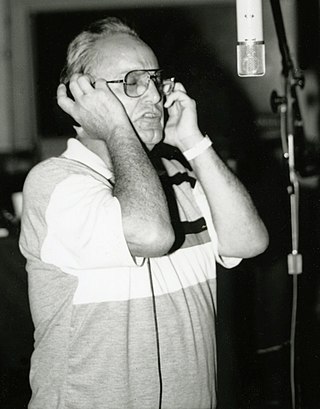
Rod Bernard was an American singer who helped to pioneer the musical genre known as "swamp pop", which combined New Orleans-style rhythm and blues, country and western, and Cajun and black Creole music. He is generally considered one of the foremost musicians of this south Louisiana-east Texas idiom, along with such notables as Bobby Charles, Johnnie Allan, Tommy McLain, and Warren Storm.
Sam Dees is an American soul singer, songwriter and record producer. He has released several albums throughout the 1970s, 1980s, and the 1990s; as a composer, he has written hundreds of songs for many music artists.
The Muscle Shoals Rhythm Section is a group of American session musicians based in the northern Alabama town of Muscle Shoals. One of the most prominent American studio house bands from the 1960s to the 1980s, these musicians, individually or as a group, have been associated with more than 500 recordings, including 75 gold and platinum hits. They were masters at creating a southern combination of R&B, soul and country music known as the "Muscle Shoals sound" to back up black artists, who were often in disbelief to learn that the studio musicians were white. Over the years from 1962 to 1969, there have been two successive groups under the name "Muscle Shoals Rhythm Section" and the common factor in the two was an association with Rick Hall at FAME Studios in Muscle Shoals.
"Sweet Dreams" or "Sweet Dreams (of You)" is a country ballad, which was written by Don Gibson. Gibson originally recorded the song in 1955; his version hit the top ten of Billboard's country chart, but was eclipsed by the success of a competing recording by Faron Young. In 1960, after Gibson had established himself as a country music superstar, he released a new take as a single. This version also charted in the top ten on the country chart and also crossed over to the Billboard Hot 100, where it peaked at No.93. The song has become a country standard, with other notable versions by Patsy Cline and Emmylou Harris.

Jimmy Clanton is an American singer who became known as the "swamp pop R&B teenage idol". His band recorded a hit song "Just a Dream" which Clanton had written in 1958 for the Ace Records label. It reached number four on the Billboard chart and sold a million copies. Clanton performed on Dick Clark's American Bandstand and toured with popular artists like Fats Domino, Jerry Lee Lewis and the Platters.
C. C. Adcock is an American singer, songwriter, guitarist and blues rock musician, noted for his cajun, zydeco, electric blues and swamp pop-influenced sound and for his efforts to preserve and promote swamp pop music. He is also a Grammy-nominated music producer and film and TV composer.

Dale Houston was an American singer who in a duo with his performing partner, Grace Broussard, hit the Billboard chart as Dale & Grace with two rock and roll singles. The first was the No. 1 gold record "I'm Leaving It Up to You" in 1963. "Stop and Think It Over" reached No. 8 in 1964. In his later years, Houston was reunited onstage with Broussard on several occasions. Their recordings are highly regarded examples of the Louisiana-Texas style known as "Swamp Pop".
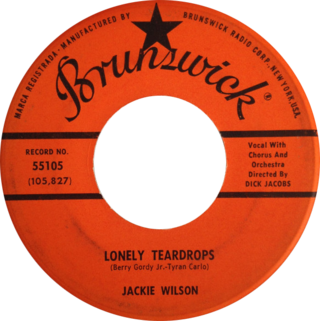
"Lonely Teardrops" is a song written by Berry Gordy Jr., Gwen Gordy and Roquel "Billy" Davis, first recorded and released as a single in 1958 by R&B singer Jackie Wilson, on the Brunswick label. The single was commercially successful, reaching the top ten on the Billboard Hot 100, and number-one on the R&B chart. It is ranked as the 57th biggest U.S. hit of 1959.
